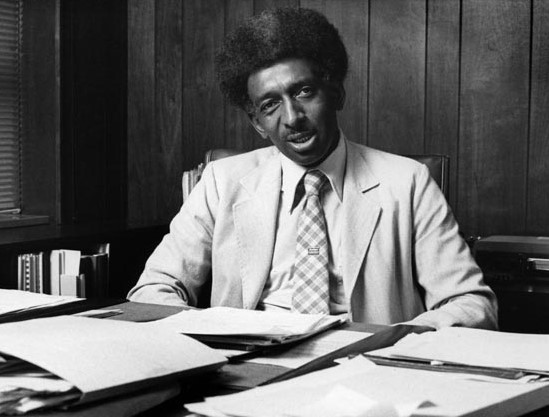Eugene E. Eubanks

1938-2011
Educator Eugene Eubanks championed equal opportunities for Black students and fought to desegregate Kansas City, Missouri, public schools.
Raised in Meadville, Pennsylvania, Eubanks showed an early interest in and aptitude for mathematics. After high school, he entered the U.S. Air Force, becoming fluent in Russian and serving as a voice interceptor and analyst. He graduated from Edinboro (Pennsylvania) State College in 1963, then worked full time as a math teacher and principal in Cleveland public schools while pursuing a master’s degree in secondary school administration from John Carroll University in Ohio. He later earned a second master’s and a doctorate from Michigan State University, specializing in urban education.
Moving from secondary to higher education, Eubanks became an assistant professor at the University of Delaware before joining the University of Missouri-Kansas City’s School of Education as an assistant dean in 1974. Six years later, he was promoted to dean of the school—the first African American to hold that post.
Early at UMKC, Eubanks became closely involved with the Kansas City, Missouri, School District. In 1983, the Board of Education picked him to lead a study of the secondary school system. His ensuing report identified low test scores, high dropout rates, and widespread illiteracy within the system, and proposed 45 pages of recommended improvements.
When a federal district court ruled in 1984 that KCMSD was unconstitutionally segregated and mandated sweeping changes to desegregate the school system—in large part based on Eubanks’ report— he was selected to chair the court-appointed desegregation monitoring committee. That same year, he took leave from UMKC to serve as deputy superintendent of schools with a goal of implementing reforms and improving student outcomes.
Eubanks emerged as an authority on urban education, equity, and school desegregation, publishing journal articles and acting as a consultant and expert witness for other desegregation cases. He served as editor of the Journal of the National Alliance of Black School Educators and president of the American Association of Colleges and Teachers in Education. Respected by his peers, he was elevated to professor emeritus and dean emeritus after retiring from UMKC.
Among his many honors, Eubanks received the Edward C. Pomeroy Award, which recognizes outstanding achievement in teacher education, and the U.S. Department of Education’s John Stanford Education Heroes Award for extraordinary commitment to improving schools and communities.
In retirement, Eubanks continued to teach math to high schoolers. His legacy is that of mentor to countless students, educators, and administrators and as an unrelenting activist for educational equity.
